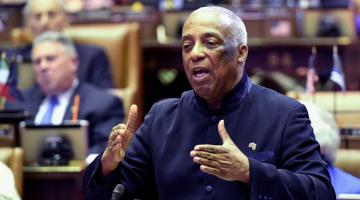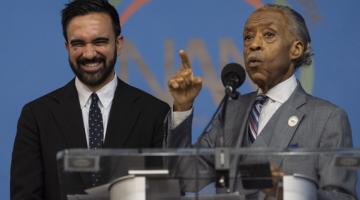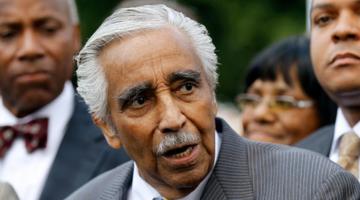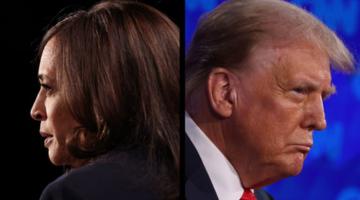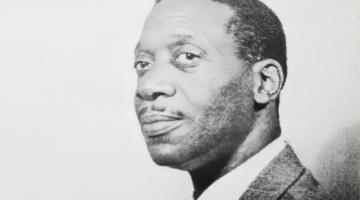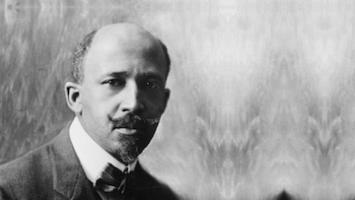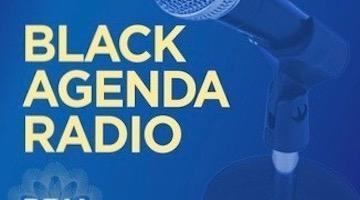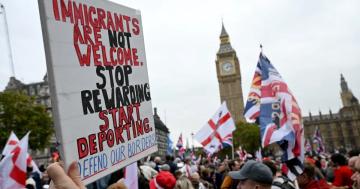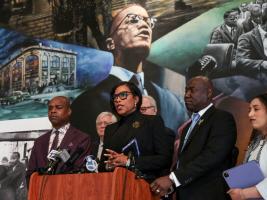The late Kevin Alexander Gray at the 2014 Fighting Bob Fest (Photo: The Progressive Magazine)
Kevin Alexander Gray analyzed Barack Obama's presidential election and its negative impact on Black people and their politics.
This article was originally published in Counterpunch.
“It’s like when you go to the dentist, and the man’s going to take your tooth. You’re going to fight him when he starts pulling. So he squirts some stuff in your jaw called novocaine, to make you think they’re not doing anything to you. So you sit there and ’cause you’ve got all of that novocaine in your jaw, you suffer peacefully. Blood running all down your jaw, and you don’t know what’s happening. ’Cause someone has taught you to suffer – peacefully.”
— Al-Hajj Malik El-Shabazz (Malcolm X), Message to the Grassroots (1964)
There’s a picture of Barack Obama next to one of Jesus in the front window of the small, black art gallery that I drive past almost everyday. And I still see someone wearing an Obama t-shirt maybe once a week, but sometimes it’s the same guy. If you’re looking, you can a find a variety of shirts in just about every corner store where I live. They’re on the wall, next to the Bob Marley, Tupac, Biggie Smalls and Al Pacino “Scarface” t-shirts. You can get an Obama hat and a presidential calendar there too. There are still a few Obama yard signs in the neighborhood, usually in a window. A few people still have an Obama bumper sticker on their cars. Not as many as some might think. Certainly not as many as the number of Confederate flags on vehicles in this part of the country.
Racial solidarity is the mood that helped get Obama into the White House. The traditional source of power and survival among blacks, it is also the novocaine of the moment, a numbing agent as people suffer through what, despite the more hopeful official forecasts, feels like a full-blown depression where I live. The pride is real, but so is the pain, and it’s coming in sharp stabs despite the shot. The novocaine is still working, just not so well, and the result is a discomfiting confusion.
In late September I spoke at a ‘‘Black Male Summit” about 80 miles northwest of Columbia in Rock Hill, South Carolina, which is famous in civil rights’ lore as the first stop in the Deep South for the Freedom Riders testing the 1960 Supreme Court decision outlawing racial segregation in all interstate public facilities. Rock Hill is where Student Nonviolent Coordinating Committee (SNCC) activist John Lewis and another man stepped off the bus and were beaten by a white mob. The town is mentioned in Chuck Berry’s “Promised Land” – only the “poor boy” on the Greyhound is lucky as his bus “bypassed Rock Hill” in the song. Things are still tough in the town just south of Charlotte. Since February of 2008 the number of jobs here has fallen by 15 per cent, and the average salary for people lucky enough to be employed is about $28,000. In June of this year, Yvette Williams, a 15 year-old black girl, was shot and killed by two police officers after she robbed a grocery store. The two officers fired on Williams five times after she pointed a gun at them and refused to drop it, according to Rock Hill Police Chief John Gregory. He said he felt the police response was justified. A witness who lives across the street from where the shooting happened, told the local paper she was in bed when she heard shots and got up, looked out her window and saw the girl fall to the ground. She said she then saw an officer shoot again.
The theme I was asked to speak on in Rock Hill was “How do we restore dignity back to black communities?” My initial response was I didn’t know we’d lost it. But I knew the idea was a nod to Obama’s tough-love trick bag. “Post-racialism” is nonsense, but as an ideological concept it’s real, with real political consequences. On the right, it is license for white blowhards to go on any racist tirade they like so long as they don’t actually broadcast the word “nigger.” In the black community it’s alive wherever blacks argue among themselves as to whether they are individually or collectively responsible for the conditions they face, or if they’re as criminal or immoral or lazy or violent or promiscuous or stupid as racists believe them to be. Sherman Porterfield, one of the organizers of the event, was quoted in the local paper, “Obama talked about it,” this claimed loss of dignity; “he has challenged us. The question now is, are we up to the challenge? Our young people are dropping out of school in record numbers, and it’s our fault. Nobody is shooting water hoses at us anymore. But we are allowing our young brothers to shoot each other. And that is not acceptable.”
I’ve known Porterfield since the 1988 Jesse Jackson campaign when he was a car salesman and donated the campaign cars. I like him. As folks say, “his heart is in the right place.” Still, I was surprised when he invited me to speak to his group. We’ve talked politics over the years. Our conversations haven’t been discourteous, but we don’t always see eye to eye. I‘ve been reluctant to say whether I think Obama is good or bad for black people, but I’ve always been clear that skin color has never been a sufficient factor for winning my political support. I was antsy about the invite because I didn’t want to be put on the hot seat. Race solidarity is a big stumbling block these days. Say the wrong thing and you’re called a “hater.” But I didn’t go to bad-mouth Obama. I went to talk about a different kind of solidarity, one informed by an understanding of the structures that keep people down. I had 45 minutes to speak, followed by a panel consisting of a preacher, school administrator, police chief, two politicians and a government worker.
Before introducing me, Sherman briefly repeated what he said in the newspaper article. The people applauded when he said Obama’s name. It wasn’t long or raucous, but it governed how I managed my words. I opened with Malcolm’s novocaine quote. I was careful. I tried to stay on the economic and social numbers and on how precarious a time it is for blacks. I talked about the unemployed, the dropout rate, and police violence, with the Williams’ killing in mind.
The audience was open to what I had to say about the police having too much power. I mentioned how the share of public funds to the police-penal state has nearly doubled as a percentage of civilian government spending over the past 50 years and now stands at 15 per cent of the latter and that we needed to de-militarize the police and end the drug war. I said that I understood why Obama backed off of the “police acted stupidly” in the Henry Louis Gates’ affair so as not to sidetrack his health insurance funding push. But I didn’t yield on him being wrong for not supporting free speech or First Amendment rights and the right to be secure in one’s home. I reminded the audience that while a disorderly charge is “minor” in that it’s only a misdemeanor, many young black, brown and poor whites get their first taste of jail by misuse of the charge.
In the talk I had said that Obama siding with Sgt. James Crowley wasn’t as egregious as his Justice Department going before the Supreme Court in May to argue against a 23-year-old precedent for defendants’ rights set by Michigan v. Jackson. The issue before the Court was whether a defendant who has already been appointed counsel may be interrogated by police without that counsel present. The Justice Department agreed with Justice Antonin Scalia that the Michigan restriction “serves no purpose,” and the Court ruled by a 5-4 decision that such interrogation was not a violation of a defendant’s Sixth Amendment right to counsel. Justice John Paul Stevens, who wrote the 1986 Michigan decision, spoke for the dissenters saying, “If a defendant is entitled to protection from police-initiated interrogation under the Sixth Amendment when he merely requests a lawyer, he is even more obviously entitled to such protection when he has secured a lawyer.”
I addressed Porterfield’s assertion that “our young people are dropping out of school in record numbers, and it’s our fault.” In South Carolina, according to the State Legislative Black Caucus, only three out of ten black males and four out of ten black females graduate from high school, but pick just about any state or locale, and the black and brown graduation rates are low and the dropout rates are high. So, people can believe either that most of their kids are stupid or that something’s wrong with an educational system with such a high failure rate and so much flimflam around school reform.
In South Carolina, Democrat Robert Ford has made school reform his marquee issue in preparing to run for governor next year. This past year Ford offered a bill in the General Assembly that would make uttering profanity in public — whether in writing or orally — a felony and another bill that would require South Carolina cities and counties to give their workers a paid day off for Confederate Memorial Day or lose millions in state funds. Now he’s pushing charter schools although it is unclear what his plan is or if he has one. Many believe he’s in it for the money. He’s allied with Al Sharpton who jumped aboard the corporate education reform gravy train after receiving a half million dollars last year for his National Action Network, reportedly brokered by New York City Schools Chancellor Joel Klein through a right-wing non-profit agency that promotes charter schools. I mentioned the president’s friend and fellow Chicagoan, Secretary of Education Arne Duncan, who tried out his experiments in reform first on public school students in Chicago, where he was a CEO of Chicago Public Schools. Duncan militarized and corporatized the third largest school system in the nation, vastly expanded draconian student expulsions, instituted sweeping surveillance practices, advocated a growing police presence in the schools, arbitrarily shut down entire schools and fired entire school staffs. As a result Chicago’s public schools are now being sued by black teachers for racial discrimination over the dismissal of hundreds of qualified black teachers, replaced with younger, cheaper, less experienced and mostly whiter ones. And, some suggest that his charter schools plan has led to a spike in violence. Yet the Obama administration is withholding federal education funds from states and school districts to force nationwide implementation of Duncan’s charter school model.
The audience nodded approval when I warned them to be on the lookout for politicians who could make things worse by offering nothing but a flimsy promise of something better. They gave a start when I said I hoped Joe Wilson was right in calling Obama a liar after the president said that improvements in the health care system would not apply to undocumented immigrants. It was a church-going crowd so I quickly followed with the story of the Good Samaritan and said a Christian is bound to give aid or health care to the stranger or immigrant. They also nodded in agreement when I said that Jimmy Carter, an 85-year-old white Southerner knew more about how white Southerners feel, think or believe than the son of a white woman from Kansas and a black man from Kenya who was raised in Hawai’i and Indonesia. And maybe many of them, raised in the South, in a state that honors the Confederate flag, did too.
When it was the panelists’ turn, the youth jobs coordinator said he sent kids home even before he interviewed them if they exhibited behavior that he didn’t like, such as talking in the waiting room or wearing saggy pants. They’re probably the kids that need help the most, I thought, but he said he told them “to go home and ask your mother why you didn’t get in the program.” The school administrator favored Obama’s charter school approach. The cop talked about “weed and seed,” a 1980s-vintage federal program that aims to weed out the bad elements in a neighborhood via police power and community collaboration, although I’m still unsure what type of seeding comes after other than federal dollars. The politicians didn’t have much to offer. The preacher had the last word. He was on the defensive about what the church was or wasn’t doing in the community these days, and reiterated the need for black men “to be responsible.”
I had concluded my rap, saying black politics was about more than just one person, whether that be the man on the street or the man in the White House. That blacks should treat Obama as they would any other person in power. And that it doesn’t help them, or him, to stand down, back up or hush up. They had to give him some backbone.
Doubtless, most blacks never expected Obama to take racism and its material effects head on. I keep hearing, “We know he can’t say everything that’s on his mind,” or “He‘s doing the best he can under the circumstances” – those “circumstances” being white people. That’s usually followed by “if you can’t say something good, don’t say anything at all.” I was talking about how subdued blacks seem to be with a friend who works in a university office where there are few other blacks. I had to listen hard as she whispered into the phone: “You know how they [whites] are. They think we can’t do anything. To them there’s always something wrong with us even when it’s not evident or even there. So when they tear him [Obama] down, they are really tearing all of us down. So we got to stand behind the brother.”
Many blacks, regardless of class, see themselves and their aspirations in Obama. The threats against his life only strengthen that support. Their enthusiasm may also reflect an optimism that the nation is on the way to becoming a less racist and fairer one. It seems that black middle class support is tied in with their societal role as control agents and their illusions of being part of what W.E.B. Dubois called “the talented tenth.” The black bourgeoisie wants acceptance by whites and Obama represents this acceptance. For others, his “just not embarrassing black folk” is enough. So folk just cross their fingers in hopes that even though he may never openly express it, he understands what white entitlement and racism is all about.
At a conference in Atlanta of Sharpton’s National Action Network this summer, John Silvanus Wilson, the executive director of the White House Initiative on Historically Black Colleges and Universities (HBCU), was urging his audience simply to believe. Obama has “top notch blacks” in his administration who “would do what they could” to help financially struggling black colleges, Wilson told the group, but people had to “chill out” and “give them time.” He warned that schools ought not expect the government to be enthused about helping them “if their alumni weren’t giving to the schools.” That sounds reasonable if one ignores the reality that many former HBCU students are strapped for years after graduation paying back loans at a higher interest rate than the bank that received government bailout money have to pay back. Before ending his talk Wilson asked for “patience,” urging the audience to “crush the haters” who would challenge the pace of the administration in addressing black concerns.
Yet that silence has allowed Obama to get away with not saying or doing anything that would appear to favor black interest, and doing things against their interest, like bailing out Wall Street fat cats while everyday people are cast adrift, and saying things to and about black people that a white person couldn’t say without challenge or scorn, things he’d dare not say to any other racial or ethnic group in the United States. As much as some people might like to believe the post-racial storyline of Obama, the side effect is that he becomes the substitute for real structural progress, and blacks are left to suck it up and either pretend racism isn’t what it is or question their understanding of what it is.
All of this has put people in an awkward bind, knowing things aren’t right but trying to justify their loyalty anyway. In the 1998 movie Primary Colors, based on the first presidential bid of Bill Clinton, campaign manager Henry Burton is confronted by his ex-girlfriend demanding to know why he was working for someone she considered to be just another unprincipled politician. Henry responds, “I can tell the difference between a man who believes what I believe and lies to get elected, and a man who just doesn’t give a fuck. And I’ll take the liar.”
If only it were that simple.
For me, what is simple is that Obama hasn’t had to offer much to get and keep black support, so he hasn’t. And, he hasn’t had to lie about it. At a June 23rd press conference, a black reporter asked Obama what he intended to do in the face of reports that the African-American unemployment rate will go to 20 per cent or more by the end of this year. The reporter asked, “Why not target intervention now to stop the bloodletting in the black unemployment rate?” Obama offered trickle-down economics saying, “The best thing that I can do for the African-American community or the Latino community or the Asian community, whatever community, is to get the economy as a whole moving.” It was as though the unemployed were not part of the “whole” that needs to get “moving.”
Unemployment among blacks was high before Obama took office. For blacks in the 16-24 age group it’s been double-digit unemployment for decades. Nevertheless, in the time between George W. Bush’s relocation back to Texas and Obama’s move into the White House, the unemployment rates for the parents of many of those unemployed youth nearly doubled. As of September, the “official” Bureau of Labor Statistics data shows the overall black unemployment rate at 15.4 per cent: 16.5 per cent for adult men, 12.5 for adult women and 40.8 per cent for teenagers. Some economists estimate that the actual overall rate is in the 27 to 30 per cent range, with the “unofficial” teenage rate far surpassing the 50 per cent mark. Perhaps, the only uptick in young black male employment in the last year has been in illicit drug sales.
By any economic measure the black community is in a severe depression. African Americans make up about 13 per cent of the population but represent 17 per cent of the uninsured. Nearly 25 per cent of blacks, or 9.4 million people, lived in poverty in the United States in 2008, compared with 8.6 per cent of whites, or 17 million people. Of the 2.3 million people in jail or prison, half are black. Among black women ages 35 to 39, one in 100 is behind bars, compared with one in 355 for white women in the same age group. Yet no targeted youth or adult jobs program was part of the $787 billion stimulus package. The most that the jobless got out the stimulus deal was extension of unemployment benefits, if they hadn’t already dropped off the rolls. At best, stimulus dollars forestalled some teachers being laid off and kept road crews working. If hiring more cops is a good thing, the bill did that as well. Yet, unless the parents of those unemployed young people were fortunate enough to have a public works job, many were facing foreclosure and other financial woes.
Obama is not the culprit for the crisis in black homeownership. There have been big problems for a very long time. According to the NAACP, before the current foreclosures wave, African Americans had a homeowners’ rate of 47.2 per cent, compared with 75.2 per cent for whites. Between 2004 and 2007 the black home ownership rate declined by nearly two percentage points. According to the Home Mortgage Disclosure Act database, minorities got half the subprime loans (for home purchases and refinancings) handed out in the big years of 2004-07. Mortgage dollars (prime and subprime) for home purchases loaned to blacks went up 397 per cent from 1999 to 2006, compared with 100 per cent for whites. (It was a staggering 691 per cent for Hispanics.) The housing market meltdown only speeded up the process of people losing the homes they had only a 50-50 chance of keeping within the first seven years anyway.
Adding to their woes, those targeted for subprime loans are “redlined” for high interest rates for just about every financial product that the law requires them to have, like home and auto insurance on the cars they purchased via “predatory,” albeit “voluntary” consumer loans. Then, when they fall into foreclosure, the cost of everything goes up because of their diminishing Beacon score or worsening credit status. It’s the ghetto adage: “The po’ pay mo’. ” This is why 75 per cent of homeowners in foreclosure end up losing their homes.
Homeownership advocates have pleaded for a federal foreclosures moratorium in a vocal way for three or four years. They were loud enough during the 2008 primaries for Hillary Clinton to make a moratorium part of her campaign platform to try to woo black voters away from Obama. Yet even as those voters rejected Clinton, there was no hint Obama would help black homeowners with credit problems associated with being in bankruptcy and/or foreclosure. He was deaf to those who got played by a tilted set of rules and were left with bad or worse credit, saying, “We will help those with good credit who played by the rules.”
Upon entering office Obama declared, “I won’t stop until all responsible homeowners can stay in their homes.” He offered $75 billion in incentives to lenders to reduce loan payments for troubled borrowers with the “goal of preventing up to four million foreclosures”, just as the Mortgage Bankers Association reported that, in the first three months of 2009, about 5.4 million mortgages were delinquent or in some stage of foreclosure and it was going to get worse. But the lenders didn’t extend the money to people they still regarded as bad risks. Lower interest rates alone could not help struggling homeowners, who needed a meaningful “time out” to regroup financially and mentally from the stress on being on the bubble.
A few banks, Citigroup, JPMorgan Chase, Bank of America, Morgan Stanley and Wells Fargo, all initiated short-term foreclosure moratoriums and voluntary loan modifications prior to the White House plan. Some say they did it to blur notice of their prior lending practices while waiting to get their take of the $700 billion Troubled Asset Relief Program (TARP) money. Almost every bank mentioned is being sued either by investors or consumers over their behavior in the subprime-lending debacle and/or for discriminatory lending practices.
Now it appears that Obama’s anti-foreclosure plan has had little meaningful effect on the homeowners’ crisis, given the additional fuel of growing unemployment.
From March to June, a little more than 100,000 homeowners had been offered loan modifications, according to the Treasury Department. The lion’s share of initial assistance went to home-owners at the high end of the income ladder. Meanwhile, tens of thousands of distressed moderate and low-income homeowners stood in line outside sporting arenas and civic centers across the country hoping to get what help they could from advocacy groups like the Neighborhood Assistance Corporation of America. NACA did a ten-city tour and estimated it helped 180,000 participants and “successfully renegotiated loan agreements for 1 out of 3 troubled mortgagers.”
By the end of August 360,165 loans had been modified, but in July alone RealtyTrac reported 360,149 foreclosures, which means one month’s foreclosures wiped away the cumulative gains since March.
Obama’s $787 billion stimulus plan didn’t much help homeowners in distress. Most local and state governments used the money to cover deficits in their operating budgets to include ongoing downtown development to shore up the local commercial market, highway projects, and sustaining ongoing gentrification projects, which is how many of the people struggling in subprime housing developments got there in the first place. The funds also allowed local government to suspend or reduce developers’ taxes on repossessed houses or vacant properties in areas of overdevelopment. It bailed out the developers and the banks that loaned them the money to throw up all those subprime developments by giving local governments the funds to buy their foreclosed properties.
The city of Columbia used stimulus money to purchase more than “3,500 made in China or Korea tasers,” since that is where they come from, for police and to hire more officers, ostensibly to ramp up their drug war and gang suppression activities. Around the time of the Gates controversy, a young man in an adjoining neighborhood who alleges that county police were “planting drugs” on folk stopped me on the street to describe how local sheriff’s deputies swooped down en masse on an area of alleged drug activity with guns and cameras. They weren’t there just to make arrests; they also took individual snapshots of people they didn’t arrest. Whoever refused to be photographed was charged with disorderly conduct and arrested. He said he was arrested and was tased three times, yet he faced charges for assaulting an officer as he was twitching on the ground. “They tell us that we got nobody on our side to speak for us. And they’re right,” he said.
The Gates episode and the Obama Justice Department taking sides against the rights of the accused may be signs of things to come in the face of rising unemployment and folks losing their homes by the millions. It leaves those under the gun with fewer rights the law is bound to respect and little or no recourse to complain.
So as wealth, poverty, education and health disparities between blacks and whites grow wider, and as the number of black homeless, jobless and incarcerated increases, there is a host of questions blacks need to find answers to and act on. How do they pursue a political agenda, recognizing that Obama is not the “president of black America” and is unwilling to go to the mat for black Americans or any really progressive policies? What is the change they need, and who leads the fight? The Congressional Black Caucus and its individual members have very little stroke outside of their corporate-sponsored CBC weekend. Civil rights leaders and organizations have become slaves to Wall Street and corporate America or are old and out of touch. What does the community do about that, and about the black press, now reduced to offering “great man” coverage week after week with little, if any, critical assessment of what is or isn’t being done by the Democratic president? When does it stop just being about Obama and solidarity for the sake of the symbolic?
It’s a safe bet that despite it all, Obama would hold on to overwhelming black support when re-election time rolls around. Yet blacks cannot hope to progress if they continue to miss, endure, ignore and maybe even accept the institutional denial of their real life experiences and a very real retreat from defense of some basic civil rights for solidarity’s sake. They can oppose the organized forces of white supremacy and the racist outlook validated by post-racialism, but they can’t feel sorry for Obama; he volunteered.
Princeton University Professor Cornel West, speaking after another of Obama’s “tough-love” speeches remarked, “I would rather be in a crack house than a White House that promotes neoimperial policies abroad and neoliberal policies at home.” When asked to explain himself West said, “Because in a crack house, at least I’m in solidarity with folk who are sensitive to a pain. It’s just that they have the wrong response to their pain. Instead of being in a crack house, they ought to be organizing. But they’re dealing with their suffering. They’re just dealing with it in the wrong way. The White House is escaping from the suffering.”
It used to be that the black community operated on a certain ethos – that the system was rotten and needed changing – and that the idea that people were oppressed, killed, wronged because of their race or some other factor not of their control or making was wrong. At this point in time blacks can’t worry about those freaking out because they are losing their sense of entitlement and privilege and it’s all coming apart for them. Blacks must continue to take on empire, pull it apart and build something else. In a more everyday way, in order to survive without violence being inflicted among us and against us, we must build a community-based economy. And we can’t back down on what we are trying to accomplish – a more civilized, humane and sustainable society. And if Obama is not part of the solution, he’s part of the problem. Right now, he’s the latter. And he better look out if the novocaine wears off.
Kevin Alexander Gray (1957 - 2023), was a political organizer in South Carolina and author of Waiting for Lightning to Strike! The Fundamentals of Black Politics (CounterPunch/AK Press) and a contributor to Hopeless: Barack Obama and the Politics of Illusion. He was the editor, along with JoAnn Wypijewski and Jeffrey St. Clair, of Killing Trayvons: an Anthology of American Violence from CounterPunch Books.



